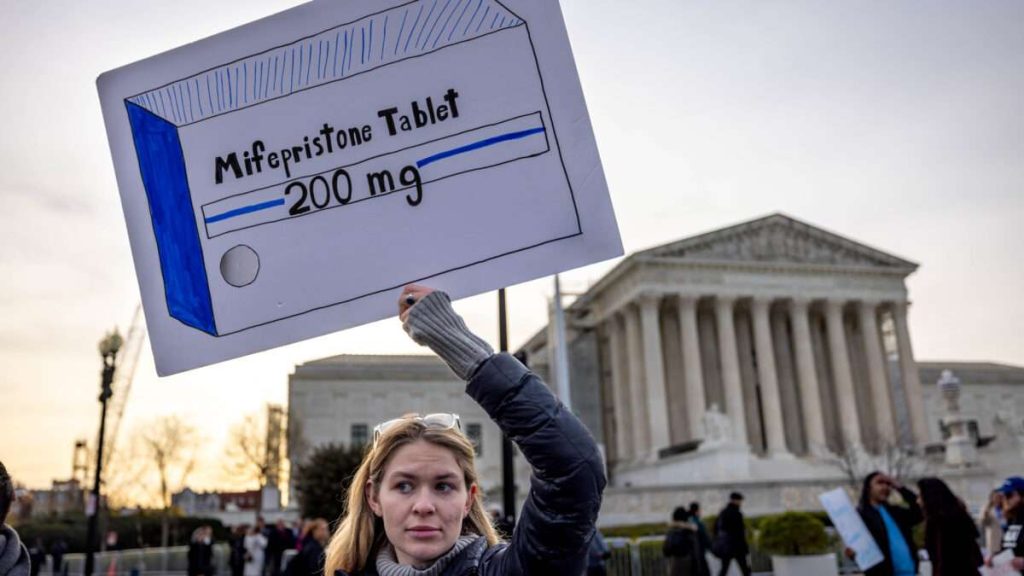Outlawing abortion is only a first step for some conservative lawmakers, who keep dreaming up increasingly invasive schemes to ferret out and punish anyone trying to circumvent these bans. The latest example of this comes from Louisiana, where House lawmakers voted this week to make the abortion-inducing drugs mifepristone and misoprostol Schedule IV controlled substances.
That would make possession of these drugs a crime—punishable by a mandatory minimum prison sentence of one year and up to five years incarceration and a fine of $5,000—unless they were “obtained directly or pursuant to a valid prescription” for something other than abortion.
The alleged rationale for this bill is especially insane. State Sen. Thomas Pressly (R–Shreveport) brought in his sister, Catherine Pressly Herring, to testify about how her husband secretly slipped her abortion drugs when she was pregnant. “I share my story because no one should have abortion pills weaponized against them,” Herring said at an April hearing.
But administering abortion pills is already illegal in Louisiana, where abortion is banned with few exceptions. The state wouldn’t need a new law designating them a controlled substance in order to punish her husband’s alleged deception.
There are also ways authorities could write a law to more narrowly target such behavior—which is in fact what Sen. Pressley is trying to do with Senate Bill (SB) 276, the larger bill to which the controlled substance change is attached. SB 276 “creates the crime of coerced criminal abortion by means of fraud to prohibit a third-party from knowingly using an abortion-inducing drug to cause, or attempt to cause, an abortion on an unsuspecting pregnant mother without her knowledge or consent,” per the state legislature’s website.
The True Target: Doctors and Pharmacists?
With or without this new crime, there is no reason the state needs to make abortion pills a Schedule IV controlled substance in order to target someone who secretly slips them into his pregnant wife’s drink. But this is a common tactic used by lawmakers trying to grant the state new power: using an extreme and sympathetic example of wrongdoing to justify a wide-reaching change that will be used in matters way beyond that example.
In this case, the most likely target is doctors who prescribe mifepristone and misoprostol.
Both drugs have multiple uses beyond inducing abortions. In fact, misoprostol originally gained traction as an anti-ulcer drug. It also has a number of obstetric uses, including inducing labor and treatment after a miscarriage. And Mifepristone is prescribed to people with Cushing syndrome and uterine leiomyomas.
Prescribing mifepristone or misoprostol for non-abortion reasons is still legal in Louisiana and other states where abortion is banned. But abortion foes worry some medical professionals may use this to covertly prescribe it for abortions.
If these drugs are controlled substances, doctors will have to have a special Drug Enforcement Administration license to prescribe them and the state will be able to track when they’re prescribed, to whom, and at what pharmacy these prescriptions are filled.
Effect on Health Care
“Louisiana law typically categorizes medications, such as opioids, as Category IV drugs because they are addictive and thus have a high potential for abuse,” notes University of California, Davis School of Law professor Mary Ziegler at MSNBC:
To prescribe such drugs, physicians in the state need a special license, and the state tracks the patient, physician and pharmacy involved in each prescription. Therein lies one of the primary functions of the law: The state has had a hard time enforcing its abortion ban in part because it is hard to identify when and how pills change hands. At least when a prescription originates in state, this bill might give Louisiana prosecutors an extra edge in identifying people to prosecute.
The bill explicitly exempts pregnant women who have misoprostol or mifepristone for their own use from prosecution—another example of the weird paternalism involved in anti-abortion laws. I’m certainly glad most states don’t want to criminalize women for attempting or having abortions, but it’s also somewhat crazy to act like the woman here is not culpable for her actions but someone who helped her get abortion pills is.
While the law might not result in sending women to prison over abortion drugs, it could be bad for the health of women with miscarriages and other obstetric issues for which misoprostol and mifepristone are prescribed, as well as for people with ulcers and Cushing’s disease.
Doctors are likely to be leery of prescribing these medications for people who need them, much in the same way that crackdowns on pain pills and ADHD medications have harmed people who legitimately need these medicines for health conditions.
What’s Next
The bill seems likely to pass.
Louisiana’s Senate passed SB 276 without the controlled substances amendment by a unanimous vote back in April.
It defines the crime of coerced abortion by means of fraud as “a person knowingly and intentionally engages in the use or attempted use of an abortion-inducing drug on a pregnant woman, without her knowledge or consent, to cause an abortion,” and prescribed a punishment of five to 10 years in prison and a fine of up to $75,000 if the woman was less than three months pregnant and 10 to 20 years in prison and a fine of up to $100,000 if the pregnancy was further along than three months.
It also amends the state’s prohibition on “criminal abortion by means of abortion-inducing drugs” to include not just causing an abortion by “delivering, dispensing, distributing, or providing a pregnant woman with an abortion-inducing drug” but also with attempting to cause an abortion by these means.
SB 276 passed the House, with the amendment, on Tuesday, by a vote of 64-29. This version contains an amendment declaring “any material, compound, mixture, or preparation containing any detectable quantity of mifepristone or misoprostol” to be a Schedule IV controlled substance in Louisiana.
The measure now goes back to the Senate for another vote.
More Sex & Tech News
• Florida is micromanaging what massage therapists can wear in the name of “cracking down on human trafficking.” Under a new law signed by Gov. Ron DeSantis last week, their clothing must be “fully opaque and made of non-translucent material.” The law also stipulates that window coverings at massage businesses must allow in 35 percent of light. This is the kind of law that will do naught for “human trafficking” or labor exploitation, of course. But it does give authorities more pretense to investigate, sanction, and shut down massage businesses of the sort disfavored in many communities.
• The Woodhull Foundation and the Electronic Frontier Foundation are urging the U.S. Supreme Court to find Texas’ age-verification mandate (part of H.B. 1181) unconstitutional.
• California is the latest state to advance an age verification measure.
• Washington and Silicon Valley are gearing up for a war over AI.
Today’s Image
Patio Jesus | Bushwick, 2013 (ENB/Reason)
The post Louisiana Moves To Make Abortion Pills a Controlled Substance appeared first on Reason.com.







